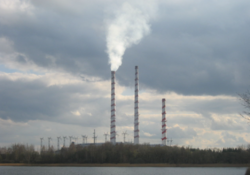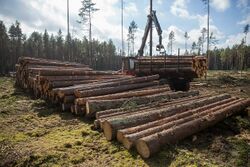Baltica: Difference between revisions
No edit summary |
No edit summary |
||
| Line 87: | Line 87: | ||
However, following a large fire in 2001, the power plant had to be closed and Baltica had to begin expanding its energy variety. Currently, multiple of the “mega projects' ' have been pushed into the limelight, particularly Ugadi Nuclear Power Plant, a Large Nuclear power plant, planned to be constructed in the city of Ugadi and the Kretia Hydroelectric power station, a planned hydroelectric dam to be constructed on the Balandi river. Although currently these projects are only in the planning stages, if they were to be constructed they have the potential to turn Baltica into a energy exporter, and possible key player in middle Argis. | However, following a large fire in 2001, the power plant had to be closed and Baltica had to begin expanding its energy variety. Currently, multiple of the “mega projects' ' have been pushed into the limelight, particularly Ugadi Nuclear Power Plant, a Large Nuclear power plant, planned to be constructed in the city of Ugadi and the Kretia Hydroelectric power station, a planned hydroelectric dam to be constructed on the Balandi river. Although currently these projects are only in the planning stages, if they were to be constructed they have the potential to turn Baltica into a energy exporter, and possible key player in middle Argis. | ||
[[File:Krugiti Power Plant.png|250px|thumb|Krugiti Coal Power Plant, shortly before the great fire.]] | [[File:Krugiti Power Plant.png|250px|thumb|right|Krugiti Coal Power Plant, shortly before the great fire.]] | ||
For now, about 46% of all energy in Baltica comes from coal, with 18% from oil, and 11% with Hydro. The rest make up a small majority, but include Solar (8.2%) Wind (5.1%) and Biofuel (8.7%) and geothermal (3%). | For now, about 46% of all energy in Baltica comes from coal, with 18% from oil, and 11% with Hydro. The rest make up a small majority, but include Solar (8.2%) Wind (5.1%) and Biofuel (8.7%) and geothermal (3%). | ||
| Line 93: | Line 93: | ||
===Industry=== | ===Industry=== | ||
For most of its existence, Baltica had been a agrarian state, mostly relying on its Southern Territories; which had strangely fertile soil, to fuel its economy. Today it still remains Balticas largest Industry, making up over 21% of all total GDP, and employing over a million people. Its mostly know for its cheese, know as Dzugi, which almost makes up 2% of the whole economy. Dairy as a whole remains a big part of the Agricultural Sector. Strawberries, potatoes, wheat and rye make up most of the crops produced by Baltica, rye especially, due to its use in alcohol and bread making. | For most of its existence, Baltica had been a agrarian state, mostly relying on its Southern Territories; which had strangely fertile soil, to fuel its economy. Today it still remains Balticas largest Industry, making up over 21% of all total GDP, and employing over a million people. Its mostly know for its cheese, know as Dzugi, which almost makes up 2% of the whole economy. Dairy as a whole remains a big part of the Agricultural Sector. Strawberries, potatoes, wheat and rye make up most of the crops produced by Baltica, rye especially, due to its use in alcohol and bread making. | ||
[[File:Logging Camp.jpg|250px|thumb|left]] | |||
Although Balticas industry is comparably small, over the recent years it has begun to specialize in manufacturing, specifically furniture. Baltica has developed a taste for constructing mostly wood made items, relying on its abundance in forested areas in the North to fuel this recent expansion. Notably, the company Uklea has created a monopoly of wood manufacturing and harvesting, and is leading Baltica to a age of economic growth. Other companies have been opened in the mostly rural undeveloped North, leading to the Northern Economic Boom. | Although Balticas industry is comparably small, over the recent years it has begun to specialize in manufacturing, specifically furniture. Baltica has developed a taste for constructing mostly wood made items, relying on its abundance in forested areas in the North to fuel this recent expansion. Notably, the company Uklea has created a monopoly of wood manufacturing and harvesting, and is leading Baltica to a age of economic growth. Other companies have been opened in the mostly rural undeveloped North, leading to the Northern Economic Boom. | ||
Although Baltica doesn't produce many luxury goods, the nation has been renown for its alcohol which some consider the best in Argis. It also led to Baltica becoming one of the highest consumers of alcohol in the world. | Although Baltica doesn't produce many luxury goods, the nation has been renown for its alcohol which some consider the best in Argis. It also led to Baltica becoming one of the highest consumers of alcohol in the world. Cigarettes also remain a very sought after commodity in Baltica, with local brand Uki being the favorite in Baltica by far; manly due its low cost and and availability. Although the fur trade is not as prevalent in Baltica as it once used to be, areas of the North are still regarded as producing some of the finest traditional fur clothing in the entirety of Argis. | ||
===Infrastructure=== | ===Infrastructure=== | ||
Revision as of 20:14, 6 December 2021
Republic of Baltica Baltijos Respublika | |
|---|---|
| Motto: "If god is with us, who is against us ?" | |
| Anthem: "The March goes on" | |
| Capital | Goja |
| Largest city | Goja, Kretia, Svejukis |
| Ethnic groups |
|
| Demonym(s) | Baltican |
| Government | Republic |
• President | Algridas Banis |
| Legislature | The National Council |
| General Council | |
| Regional Council | |
| Independent | |
| Population | |
• 2019 estimate | 14,821,213 |
• 2020 census | 14,800,312 |
• Density | 43/km2 (111.4/sq mi) |
| GDP (nominal) | 2018 estimate |
• Total | 90,213,343 |
• Per capita | 11,213 |
| HDI (0.68) | 0.67 medium |
| Currency | Zedai |
| Date format | dd/mm/yyyy |
| Driving side | right |
| Internet TLD | .Btc |
The Republic of Baltica or Baltica, is a “republic” located on the continent of Argis, specifically around the great lakes region. It is home to 14.8 Million people, and has a GDP of 90 Billion Baltica Zeidas. The Capital of Baltica is Goja, which is also its largest city, with over 700 thousand inhabitants.Currently its divided into 21 states, the largest of which remains Kauni County with over 1.9 million people within it. Today its main industries remain its large agricultural sector as well as its emerging timber business.
Baltica is currently ruled by President Algridas Banis, who has been president of Baltica for over 33 years. Many would describe Baltica as a “dictatorship” which it is, but surprisingly it continues to boast a somewhat high level of political freedom, with the citizens having access to freedom of speech, the ability to elect local county mayors and choose members for the "Regional Council of Aestia".It currently borders the Nations of Mokhavia to the North and Transbaltia to the South.
History
Geography
Climate
Environment
Politics
Government
Military
Foreign relations
Economy
Energy
Baltica has historically had a track record of poor energy production. Due to the vey high instability and consistent fighting between the German Balts and the Regular Balts, multiple so called “mega projects” have been abandoned due to the government's failure to secure both funding and materials to construct them. As such, Baltica had to mainly rely on coal, and eventually oil for most of its energy production. The Krugiti Power plant, was the largest coal power plant in Baltica, and for a while its main energy production site, supplying over 19% of all energy in Baltica.
However, following a large fire in 2001, the power plant had to be closed and Baltica had to begin expanding its energy variety. Currently, multiple of the “mega projects' ' have been pushed into the limelight, particularly Ugadi Nuclear Power Plant, a Large Nuclear power plant, planned to be constructed in the city of Ugadi and the Kretia Hydroelectric power station, a planned hydroelectric dam to be constructed on the Balandi river. Although currently these projects are only in the planning stages, if they were to be constructed they have the potential to turn Baltica into a energy exporter, and possible key player in middle Argis.
For now, about 46% of all energy in Baltica comes from coal, with 18% from oil, and 11% with Hydro. The rest make up a small majority, but include Solar (8.2%) Wind (5.1%) and Biofuel (8.7%) and geothermal (3%).
Industry
For most of its existence, Baltica had been a agrarian state, mostly relying on its Southern Territories; which had strangely fertile soil, to fuel its economy. Today it still remains Balticas largest Industry, making up over 21% of all total GDP, and employing over a million people. Its mostly know for its cheese, know as Dzugi, which almost makes up 2% of the whole economy. Dairy as a whole remains a big part of the Agricultural Sector. Strawberries, potatoes, wheat and rye make up most of the crops produced by Baltica, rye especially, due to its use in alcohol and bread making.
Although Balticas industry is comparably small, over the recent years it has begun to specialize in manufacturing, specifically furniture. Baltica has developed a taste for constructing mostly wood made items, relying on its abundance in forested areas in the North to fuel this recent expansion. Notably, the company Uklea has created a monopoly of wood manufacturing and harvesting, and is leading Baltica to a age of economic growth. Other companies have been opened in the mostly rural undeveloped North, leading to the Northern Economic Boom.
Although Baltica doesn't produce many luxury goods, the nation has been renown for its alcohol which some consider the best in Argis. It also led to Baltica becoming one of the highest consumers of alcohol in the world. Cigarettes also remain a very sought after commodity in Baltica, with local brand Uki being the favorite in Baltica by far; manly due its low cost and and availability. Although the fur trade is not as prevalent in Baltica as it once used to be, areas of the North are still regarded as producing some of the finest traditional fur clothing in the entirety of Argis.



